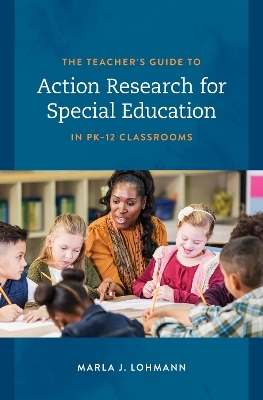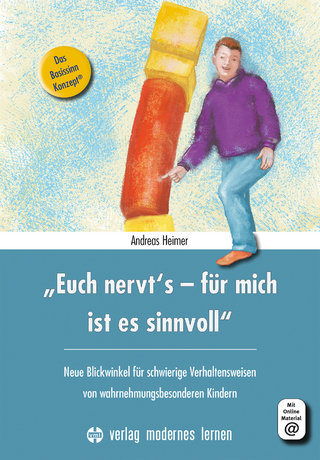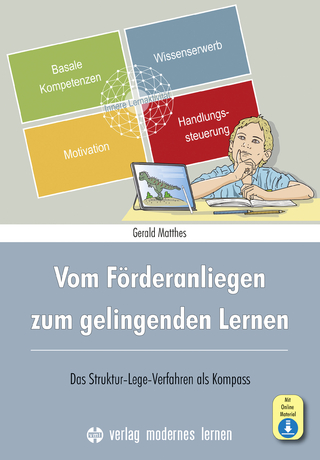
The Teacher's Guide to Action Research for Special Education in PK–12 Classrooms
Rowman & Littlefield (Verlag)
978-1-5381-5519-6 (ISBN)
Action research is the process of (a) identifying a problem in the classroom, (b) collecting data to better understand the problem, (c) researching evidence-based interventions for addressing the problem, (d) selecting and implementing an intervention, (e) collecting data to determine the effectiveness of the intervention, and (f) making changes to the intervention based on that data. In the special education classroom, action research is an integral part of the IEP process and should be used in IEP planning, implementation, and evaluation. The Teacher’s Guide to Action Research for Special Education in PK-12 Classrooms is intended for use as a textbook in special education action research courses, but includes practical applications and easy-to-understand verbiage for all readers, as well as reproducible data collection forms. The expected readership of the book are current and future preschool through twelfth grade special education teachers. After reading this book, pre-service and in-service teachers will be better prepared for systematically using data to support decision making in their classrooms. Because of the reproducible forms and explicit instructions on the use of action research, readers will be able to immediately begin conducting action research in their own classrooms after reading this book.
Marla J. Lohmann, PhD, is an Associate Professor of Special Education at Colorado Christian University, where she teaches courses on supporting students with disabilities, assistive technology, and action research. Dr. Lohmann has been in the Education field for over 20 years and is passionate about ensuring success for all children and their teachers. You can connect with her via Twitter: @MarlaLohmann
List of Figures
Acknowledgments
Chapter 1: What is Special Education Action Research?
Student Learning Objectives
What is Research?
Action Research in Daily Life
The Action Research Process
Action Research in the IEP Process
Traditional Research vs. Action Research
Quantitative Research, Qualitative Research, & Mixed Methods Research
Why Should I Do Action Research?
Conclusion
Review Questions and Exercises
Chapter 2: Identifying Classroom Learning Challenges and Collecting Baseline Data
Student Learning Objectives
Data-Driven Decision Making
Defining Learning or Behavior Challenge
Collecting Baseline Data
Assessment Data
Work Samples
Observations
Surveys/Questionnaires
Checklists
Rating Scales
Interviews
The Challenge with Only Relying on Formal Assessments
Data Literacy
Additional Data Collection Considerations
Forming a Problem Statement
Conclusion
Review Questions and Exercises
Chapter 3: Identifying Potential Evidence-Based Interventions
Student Learning Objectives
Evidence-Based Practices
Locating EBPs
Finding EBPs Without Access to a University Database
Determining the Appropriateness of an EBP for your Student
Designing an Intervention Plan
Conclusion
Review Questions and Exercises
Chapter 4: Implementing an Avidence-Based Intervention
Student Learning Objectives
Planning for the Intervention
IRB Applications & Approval
Implementing the Intervention
Implementation Fidelity
Conclusion
Review Questions and Exercises
Chapter 5: Evaluating the Effectiveness of Your Intervention
Student Learning Objectives
Formative Evaluation
Analyzing the Formative Data
Determining Effectiveness of Intervention
Conclusion
Review Questions and Exercises
Chapter 6: Sharing Your Research
Student Learning Objectives
Sharing Data with Colleagues
Rationale for Sharing Data with Education Community
Sharing your Research with the Education Community Through Presentations
Sharing your Research with the Education Community Through an Article
Conclusion
Review Questions and Exercises
Chapter 7: Conclusion
Student Learning Objectives
Action Research and the IEP
Moving Forward
Review Questions and Exercises
Appendix A: Case Studies: Sample Action Research Projects
Case Study: Pierre
Case Study: Jack
Case Study: Jose
Appendix B: Case Studies for Student Practice
Case Study 1: Communication Delay in Preschool
Case Study 2: Self-Injury Behavior in 6th Grade
Case Study 3: HyperActivity in 1st Grade
Case Study 4: Paraprofessional Training
References
Index
About the Author
| Erscheinungsdatum | 06.01.2023 |
|---|---|
| Verlagsort | Lanham, MD |
| Sprache | englisch |
| Maße | 185 x 262 mm |
| Gewicht | 562 g |
| Themenwelt | Sozialwissenschaften ► Pädagogik ► Sonder-, Heil- und Förderpädagogik |
| Sozialwissenschaften ► Pädagogik ► Sozialpädagogik | |
| ISBN-10 | 1-5381-5519-2 / 1538155192 |
| ISBN-13 | 978-1-5381-5519-6 / 9781538155196 |
| Zustand | Neuware |
| Haben Sie eine Frage zum Produkt? |
aus dem Bereich


